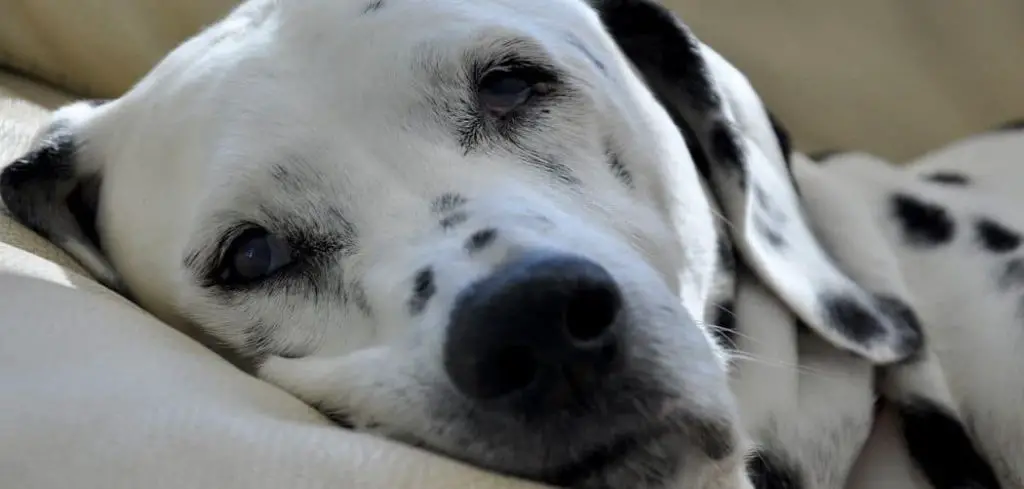When your dog is both sneezing and experiencing diarrhea, it can feel alarming and confusing. These two symptoms together may point to something more complex than a simple cold or stomach upset.
We outline the possible causes of dog sneezing and diarrhea, what you can do at home, and when to seek veterinary help.
Table of Contents
Dog Sneezing and Diarrhea — Why It Happens
Dogs may sneeze and have diarrhea at the same time due to infections, allergies, parasites, or systemic illnesses that affect both the respiratory and digestive systems. Irritants like dust, pollen, or mold can trigger sneezing, while contaminated food or intestinal parasites can lead to diarrhea.
Viral and bacterial infections often affect multiple systems, which explains why both symptoms can occur together.
Even stress or sudden dietary changes can play a role, making the underlying cause worth investigating.

Dog Sneezing and Diarrhea: Possible Causes
Respiratory Infections
Respiratory infections such as canine influenza or kennel cough can sometimes extend beyond the nose and throat, affecting your dog’s whole body.
When the immune system is fighting a virus or bacteria, the digestive tract can also be disrupted. This can result in sneezing, nasal discharge, and bouts of diarrhea happening together.
You might notice your dog coughing, seeming more tired than usual, or eating less.
Since infections spread quickly among dogs, especially in kennels or daycare, it’s important to monitor closely and seek help if symptoms escalate.
Read more: Dog Sneezing and Vomiting (What it could mean)
Allergies
Allergies are another common cause that may trigger both sneezing and diarrhea.
Dogs can react to environmental allergens like pollen or dust mites, as well as food ingredients.
When the immune system overreacts, the respiratory tract becomes irritated (causing sneezing) and the digestive system becomes inflamed (causing diarrhea).
Along with sneezing fits, you may see watery eyes, itchy skin, or frequent paw licking. Food allergies often cause chronic digestive upset, so if your dog’s diarrhea is recurring along with sneezing, diet could be a factor.
Parasites
Intestinal parasites such as giardia, hookworms, or roundworms mainly cause diarrhea but can also weaken your dog’s immune defenses.
A weakened immune system may make them more prone to sneezing and respiratory irritation. Puppies and younger dogs are especially vulnerable to parasites and may show multiple symptoms at once.
Signs often include weight loss, bloating, or visible worms in the stool.
Because parasites can spread to humans in some cases, it’s important to have your dog tested and treated promptly.
Ingesting Irritants or Toxins
If your dog has gotten into something they shouldn’t—such as spoiled food, trash, or household chemicals—sneezing and diarrhea can appear together.
Irritants may trigger nasal inflammation if inhaled, while ingestion of toxic substances leads to gastrointestinal upset.
Other signs may include drooling, pawing at the mouth, vomiting, or lethargy. Ingestion of toxins can be very serious, so if you suspect this, immediate veterinary care is crucial.
Stress or Sudden Change
Stress impacts both the respiratory and digestive systems. A dog that has recently been boarded, moved homes, or experienced a change in routine might sneeze more due to stress-induced immune responses and also develop diarrhea.
Stress colitis is a common condition where anxiety causes temporary digestive upset.
Behavior changes such as pacing, whining, or decreased appetite may appear alongside the physical symptoms.
While stress-related sneezing and diarrhea may improve as your dog adjusts, supportive care may still be needed.
More Serious Illnesses
Underlying conditions such as canine distemper or systemic infections can cause both respiratory and gastrointestinal signs. Distemper, for example, often begins with sneezing and nasal discharge and progresses to diarrhea, vomiting, and neurological symptoms.
These illnesses are less common but can be life-threatening without treatment. If your dog is unvaccinated or showing worsening symptoms, urgent veterinary care is necessary.
What to Do If Your Dog Is Sneezing and Has Diarrhea
If your dog has mild symptoms, there are steps you can take at home. Ensure they have plenty of fresh water to prevent dehydration, since diarrhea causes fluid loss.
Offer a bland diet of boiled chicken and rice for a day or two to settle their stomach. Monitor their sneezing—if it seems to be caused by dust or mild irritants, keeping the environment clean may help.
Provide a calm, quiet space so your dog can rest and recover. If you suspect food allergies, avoid giving treats or table scraps until you can consult with your vet about dietary options.
Keep an eye on how frequently the diarrhea occurs and whether it contains blood or mucus.
When to Call or Visit Your Vet
Call your veterinarian if your dog’s diarrhea lasts longer than 24–48 hours, or if sneezing is constant and worsening.
If your dog refuses food, seems weak, or shows signs of dehydration (such as dry gums or sunken eyes), prompt veterinary attention is needed.
Seek emergency care if you notice blood in the stool, difficulty breathing, continuous vomiting, or if your dog is a puppy, senior, or has a weakened immune system. These groups are more vulnerable to complications and can deteriorate quickly.
Read more: Dog Sneezing and Wheezing (Possible causes explained)
Key Takeaway
Sneezing and diarrhea in dogs may seem like unrelated issues, but they often share common triggers such as infections, allergies, parasites, or stress.
While some cases are mild and improve with supportive care, others require quick veterinary attention.
By watching for additional warning signs and seeking timely help, you can ensure your dog stays safe and recovers quickly. Always trust your instincts—if something feels off, your veterinarian is the best resource for guidance and treatment.
